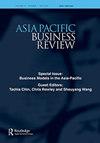后殖民流行音乐的全球化:从理论角度看韩国流行音乐产业的成功
IF 1.9
4区 管理学
Q3 BUSINESS
引用次数: 0
摘要
毫无疑问,韩国流行音乐在过去几十年里出人意料的崛起给人留下了深刻的印象。韩国已成为世界第七大音乐市场,韩国流行偶像团体虽然来自后殖民国家,但经常登上公告牌排行榜。然而,从理论和经验上解释这一现象的学术研究却很缺乏。这本合集旨在通过调查韩国流行音乐产业是如何以及为什么取得现在的地位来解决这一差距。这期特刊中的八篇文章从不同的角度探讨了这个问题:音乐本身的本质、乐迷群体中的(性别)多样性,以及领先公司采用的创新策略。总之,我们相信我们的收藏描绘了韩国流行音乐及其成功的全面图景,促进了我们对创新管理、文化产业和全球流行音乐的总体理解。关键词:韩国流行音乐,后殖民流行音乐,创新,狂热,全球化,商业模式,象征性资本,韩国披露声明,作者未发现潜在的利益冲突。作者paul Lopes是科尔盖特大学的社会学副教授。主要研究领域为文化社会学、媒体研究、艺术社会学。他撰写了大量关于“艺术世界”的反叛和转型的文章,包括普林斯顿大学出版社出版的《艺术反叛:迈尔斯·戴维斯和马丁·斯科塞斯艺术中的阶级、种族和性别》(2019年)。吴英宇,日本关西现代大学企业管理与文化研究教授,新加坡国际组织与创新研究中心研究员。他的许多著作和期刊文章涉及东亚公司治理、知识管理和商业文化。他是《亚太商业评论》的副主编。Lynn pyyun是韩国首尔梨花女子大学国际研究研究生院国际商务副教授。她对塑造企业行为的制度力量感兴趣,并一直在研究这种力量如何在人力资源管理、创新和性别问题领域发挥作用。本文章由计算机程序翻译,如有差异,请以英文原文为准。
The globalization of postcolonial pop music: putting the success of the K-pop industries into theoretical perspectives
ABSTRACTIt is uncontested that the unexpected rise of K-pop in the last decades has been no less than impressive. Korea has become the 7th largest music market in the world, and K-pop idol groups routinely are ranked on Billboard charts despite originating from a postcolonial country. However, there is dearth of scholarship theoretically and empirically to explain this phenomenon. This collection aimed to address this gap through investigating how and why the K-pop industry has achieved its present status. The eight articles included in the special issue deal with this question from various perspectives: the nature of the music itself, (gender) diversity in its fandom, and innovative strategies employed by the leading firms. Together, we believe that our collection paints a comprehensive picture of K-pop and its success, advancing our collective understanding of innovation management, cultural industries and the global pop music in general.KEYWORDS: K-poppostcolonial pop musicinnovationfandomglobalizationbusiness modelsymbolic capitalSouth Korea Disclosure statementNo potential conflict of interest was reported by the author(s).Additional informationNotes on contributorsPaul LopesPaul Lopes is Associate Professor of Sociology at Colgate University. He specializes in the fields of cultural sociology, media studies, and sociology of art. He has written extensively on rebellion and transition in “art worlds”, including Art Rebels: Class, Race and Gender in the Art of Miles Davis and Martin Scorsese (2019) from Princeton University Press.Ingyu OhIngyu Oh is Professor of Business Management and Cultural Studies at Kansai Gaidai University, Japan, and Research Fellow at the International Centre for Organization & Innovation Studies, Singapore. Many of his books and journal articles deal with East Asian corporate governance, knowledge management and business culture. He is the Deputy Editor of Asia Pacific Business Review.Lynn PyunLynn Pyun is Associate Professor of International Business at Ewha Womans University’s Graduate School of International Studies in Seoul, Korea. She is interested in the institutional forces as they shape firm behaviour and has been researching how this plays out in the realms of human resource management, innovation and gender issues.
求助全文
通过发布文献求助,成功后即可免费获取论文全文。
去求助
来源期刊

Asia Pacific Business Review
Multiple-
CiteScore
4.40
自引率
13.80%
发文量
70
期刊介绍:
The growth of the Asia Pacific region and the rising presence of its multinationals in world markets has raised a number of questions about the origins of national economic success. Asia Pacific Business Review addresses these key issues and draws together the lessons of the analysis of culture, economies, history, politics and societies in the area, in order to explore business-related phenomena in the Asia Pacific countries, both in their general and specific contexts. The Review is intended for both academics and interested observers, contains the contributions of recognized experts, and is essential to anyone seeking the latest research on Asia Pacific business in a readily available, approachable form. We welcome articles which deal with nations and societies in the Asia Pacific region, namely those in East Asia and South-East Asia (but not South Asia), including those in APEC and ASEAN, individually or comparatively. Of interest also are contributions on the Asia Pacific economies, comparing those inside with those outside, or those investing in it. We do not, however, publish papers based solely on countries from outside the region.
 求助内容:
求助内容: 应助结果提醒方式:
应助结果提醒方式:


